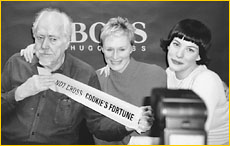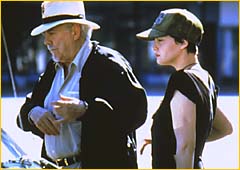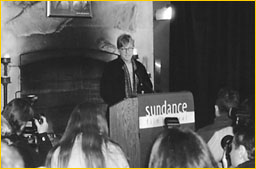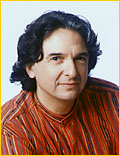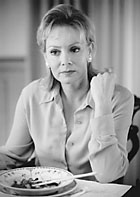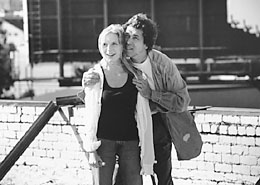
![]()
|
| |
| Director Robert Altman poses with two of the stars from his Cookie's Fortune, Glenn Close and Liv Tyler. | |
by Susan Royal
The 1999 edition of the Sundance Film Festival kicked off with the premiere of Robert Altman's Cookie's Fortune, a comedic and suspenseful drama about small town Southern life. At the film's premiere Sundance president Robert Redford praised Altman's long, non-mainstream Hollywood career, saying, "When one thinks about the definition of independent film and what it means, in my mind, there's no greater example of that than Robert Altman."
At a press conference for the film the next morning, Altman acknowledged that he and the film were selected for Sundance to draw media and public attention which could then be channeled to the lesser-known and unknown filmmakers at the fest. "It's for the filmmakers whose names you don't know yet." Altman further explained, "Years ago when M*A*S*H went to the Cannes Film Fest, that empowered me and now I have the obligation to pass that on to new filmmakers."
|
|
Joining Altman at the press conference were many of the stars of Cookie's Fortune, including Glenn Close, Liv Tyler, Charles S. Dutton, Patricia Neal, Lyle Lovett, Courtney B. Vance, Matt Malloy (In the Company of Men) and Niecy Nash. The film's screenwriter Anne Rapp said she'd "tried to write a piece about family pride - its pitfalls and how it can save you, too."
Cookie's Fortune marks the fourth time Lyle Lovett has appeared in an Altman film. He praised Altman saying, "The understanding of human nature he demonstrates always wakes me up." When asked if he hoped to combine his acting and music careers, Lovett deadpanned, "I hope to keep a job of some kind."
Although Altman is a strong supporter of Sundance and of film festivals in general ("they are probably the most important thing keeping this creative art together"), he doesn't approve of competitions at film festivals and therefore turns down all requests to serve on festival juries.
![]()
THE EVOLUTION OF SUNDANCE
|
| |
| Redford talks to the filmmakers at annual Sundance brunch. | |
He then recounted the evolution of Sundance in four steps.
First was the formation of the Sundance Institute in 1981. The impetus for the Institute was Redford's observation that the film community seemed to be eroding. "I tried to put something in place to make it easier for filmmakers...where they can explore and develop their ideas with other filmmakers in a free atmosphere."
This led to the second phase, a showcase for the films coming out of the Sundance Institute labs. In 1985 Sundance took over the management of the U.S. Film Festival in Park City and eventually re-christened it the Sundance Film Festival. "We didn't have a market in mind, but the outgrowth of the film festival is it became a market." Redford isn't entirely opposed to the commercial aspect now present at Sundance.
"I'm fine with it. It's tricky, but it's okay because it creates benefits for filmmakers. But there are some dangers. You can get hurt, disappointed and depressed when hit by the merchant mentality of distribution."
The third stage in the Sundance expansion was the Sundance Channel, which came about, says Redford, because "there was a clogging in distribution, so we went the way of television, creating a twenty-four hour a day, 7-day-a-week opportunity to see these films.
But not content to settle for cable exhibition only, Sundance expanded to a chain of movie theatres, which will be opening later this year.
Redford wants the Sundance Cinema Centers to "go beyond the cookie cutter moviegoing experience of getting in and out, instead creating a filmgoing community." The theatres will be designed as gathering places for film lovers and include libraries, bars and other amenities. They will reserve screens for independent films, documentaries and shorts. Redford said, "I personally believe documentaries should receive the same exhibition as mainstream films" and promised that the theatres will include a "basement experience for the taboo, experimental films you're not supposed to see."
Redford offered some final advice to filmmakers regarding the hype and buzz surrounding films at Sundance. "Don't be led by the need for a sale or by the buzz. Films that were unsung before and during the festival are often the ones that went on to great success later, so please don't get depressed." [An example of such a film is Gods and Monsters]
![]()
INSIDE FILM AWARDS
(If we were asked; which we weren't.)
|
| |
| Luke Wilson and Joshua Malina star in Kill the Man. | |
Scariest Film: The Blair Witch Project takes the horror genre to new heights, not through blood and gore, but a clever premise that pays off in a genuinely chilling experience.
Darkest Film: Tim Roth's directorial debut, The War Zone, a thoroughly depressing film which Roger Ebert picked as his favorite film at Sundance.
Most Buzz: Happy, Texas drew raves from Park City audiences and then a bidding war (see "The Deals" below). A very funny film about two prison escapees forced to impersonate a gay couple who coach child beauty pageant hopefuls.
|
| |
| Gregory Nava was honored at Sundance. | |
|
|
|
| |
| Jack Kerouac, Allen Ginsberg and William S. Burroughs in Chuck Workman's The Source. | |
![]()
SUNDANCE WINNERS
Three Seasons made Sundance history by being the first film to capture both the Grand Jury Award and Audience Award in the dramatic competition. It was also the first foreign language film to win either of those prizes and the first American film to be shot in Vietnam since the war. Three Seasons is the debut of director Tony Bui who developed the project at the 1996 Sundance Lab. Lisa Renzlar received the Best Cinematography (Drama) Award for her hauntingly beautiful images in this picture about an American (played by Harvey Keitel--the only non-Vietnamese actor in the film, and also the executive producer) who returns to Vietnam in search of his daughter. Three Seasons will be released in the U.S. in April.
|
| |
| Sarah Polley and Stephen Rea in Guinevere, co-winner of the Waldo Scott Screenwriting Award. | |
Regret to Inform, which presents testimonials by both American and Vietnamese women who lost their husbands in the war, won two awards in the Documentary Competition--Best Director for Barbara Sonnenborn and Best Cinematography for Emiko Omori.
Other Sundance honors include:
Best Director (Drama)
Eric Mendelsohn for Judy Berlin
Jury Prize for Short Filmmaking
Mark Osborne's More
Filmmaker's Trophy (Drama)
Gavin O'Connors' Tumbleweeds
Filmmaker's Trophy (Documentary)
John Else's Sing Faster
Audience Award for World Cinema
(a tie) Tom Tykwer's Run Lola Run and Radu Mihai Leanu's Train of Life
Waldo Salt Screenwriting Award
(a tie) Audrey Wells for Guinevere and Frank Whaley for Joe the King
Special Jury Award for Comedic Performances
Steve Zahn in Happy, Texas
Special Jury Award for Distinctive Vision
director Scott King for Treasure Island
Special Documentary Award
Nanette Burstein and Brett Morgan for On the Ropes
Latin American Cinema Jury Award
Alejandro Springall's Santitos
Special Latin American Cinema Award
Fernando Perez's Life is to Whistle
Freedom of Expression Award
Stanley Nelson's The Black Press: Soldiers Without Swords
![]()
THE DEALS
|
| |
| Illeana Douglas in Happy, Texas. | |
The Blair Witch Project was picked up by Artisan Entertainment for about $1 million.
Allison Anders and Kurt Voss' Sugar Town went to October Films for $1.25 million. Ally Sheedy stars in the film and describes it as "about people around age forty trying to function in a youth-obsessed Hollywood."
Fine Line paid over $1 million for the Filmmaker's Trophy winner, Tumbleweeds, starring Tony Award-winner Janet McTeer.
October acquired North American rights to Kill the Man for its genre division, Rogue Pictures.
Twin Falls, Idaho, a film about conjoined twins, was picked up by Sony Picture Classics for $600,000.
The Sundance Film Festival hasn't yielded any $10 million distribution deals since the purchase of The Spitfire Grill didn't pay off at the box office. But a new indie sales standard may have been set when Miramax agreed this year to pay the makers of Happy, Texas a percentage of the profits. Perhaps this is a precedent for deals to come at future fests.
![]()
Inside Film Home | News & Views | Film Fests by Month
Screenwriting | Past Articles
All Inside Film logos, artwork, stories, information and photos are
© 1997-2020 Inside Film Magazine. All rights reserved.
Do not duplicate or distribute in any form. All other logos,
artwork and photos are © their individual owners.
